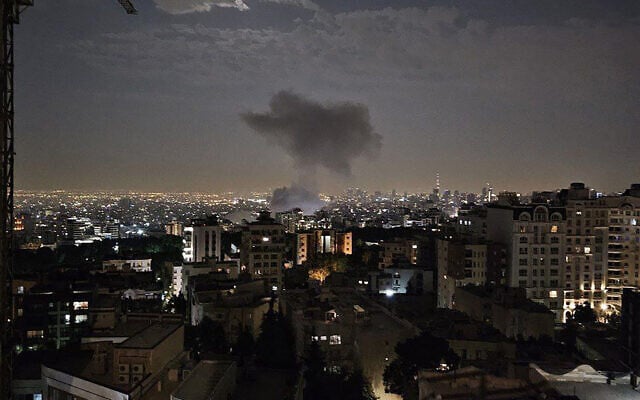
| Published June 13, 2025
The new Israeli military operation against Iran is giving President Donald Trump a fresh test of his ability to make good on his campaign promise to disentangle the U.S. from foreign conflicts
In the wake of Israel’s reported strike on Iranian nuclear facilities, President Donald Trump has issued a statement addressing the rapidly escalating tensions in the Middle East. His remarks come amid a flurry of responses from various U.S. officials, reflecting a complex geopolitical landscape that continues to unfold.
During a brief appearance on Truth Social, Trump stated, “Israel has a right to defend itself, but I hope this doesn’t escalate.” The comment came hours after Israeli forces allegedly carried out an operation targeting key components of Iran’s nuclear infrastructure. While details remain limited, the Israeli government has not formally acknowledged the action, which is believed to have taken place overnight.
The Biden administration has refrained from offering full support for Israel’s move. According to a report by The Times of Israel, officials from the U.S. State Department and the Department of Defense have expressed concerns that the strike could destabilize the region. “This was not coordinated with the United States,” an anonymous source told the outlet, emphasizing that Washington seeks to avoid entanglement in a broader military confrontation.
In a separate development, heightened security protocols were observed in major U.S. cities, including Los Angeles and New York, as a precautionary measure following the Israeli action. The Department of Homeland Security has reportedly increased threat monitoring, although no direct threats have been confirmed. According to The Independent, a small unit of Marines has been placed on standby in the Gulf region, though officials stressed that the move is “purely defensive.”
Despite the administration’s measured stance, Trump’s brief statement has stirred interest among observers, particularly given his historically close relationship with Israeli Prime Minister Benjamin Netanyahu. During his presidency, Trump oversaw several landmark foreign policy shifts favoring Israel, including the relocation of the U.S. Embassy to Jerusalem and recognition of Israeli sovereignty over the Golan Heights.
Analysts continue to monitor developments, with both Tehran and Tel Aviv maintaining tight control over public disclosures. As the situation evolves, questions remain about the future of U.S. involvement and the broader implications for Middle Eastern stability.
This handout photo released by Iran’s Revolutionary Guard Corps (IRGC) official Sepah News Telegram channel on June 13, 2025 shows smoke billowing from a site reportedly targeted by an Israeli strike in the Iranian capital Tehran early in the morning. (Sepah News/AFP)
Here are the implications based on the article content:
-
Potential Iranian Retaliation
Iran may respond through proxy attacks, cyber warfare, or direct military action, increasing the risk of regional conflict. -
Heightened Risk to U.S. Forces and Interests
American military personnel and installations in the Middle East could become targets if Iran perceives U.S. complicity or alignment with Israel. -
Destabilization of the Region
The strike could trigger a chain reaction involving Hezbollah, Hamas, or Iranian-backed militias, further destabilizing parts of the Middle East. -
Complications in Nuclear Diplomacy
Ongoing or future negotiations over Iran’s nuclear program—particularly any revival of the JCPOA—may be derailed or delayed as Tehran adopts a harder stance. -
Strain on U.S.-Israel Relations
The Biden administration’s decision to distance itself from the Israeli action might cause diplomatic friction between the two allies. -
Increased Domestic Security Vigilance in the U.S.
U.S. cities have heightened alert levels, and homeland security operations have intensified to preempt any retaliatory threats or unrest. -
Impact on Global Oil Markets
Any disruption in the region, especially near the Strait of Hormuz, could affect global oil supply chains and cause price volatility. -
Geopolitical Repositioning
Regional powers, including Saudi Arabia, Turkey, and Russia, may reassess their postures and alliances in light of increased tensions. -
Political Ramifications for U.S. Leadership
Trump’s statement and Biden’s response may influence domestic political debates over Middle East policy, national security, and military engagement. -
Public Perception and Media Narratives
Media framing and political messaging from different camps could shape how the U.S. public interprets the attack and its broader significance.
Overall Takeaway:
The Israeli strike on Iran’s nuclear facilities has triggered a cascade of geopolitical consequences, placing the Middle East on edge and prompting global responses. Former President Trump’s cautious support for Israel, contrasted with the Biden administration’s distancing, highlights a divided U.S. approach amid escalating tensions. The implications span military, diplomatic, and economic fronts—with the potential to reshape regional alliances, disrupt nuclear negotiations, and increase risks for U.S. forces and interests abroad.
SOURCES: THE GATEWAY PUNDIT – President Trump Comments on Israeli Attack on Iran; Will Hold National Security Council Meeting in Situation Room Friday Morning
THE INDEPENDENT – The Latest: Trump meets with National Security Council on Israel-Iran attacks
THE TIMES OF ISRAEL – Trump administration distances US from Israel’s attack on Iranian nuclear program






Be the first to comment